Use of 'cheap' tattoo removal equipment sparks concern
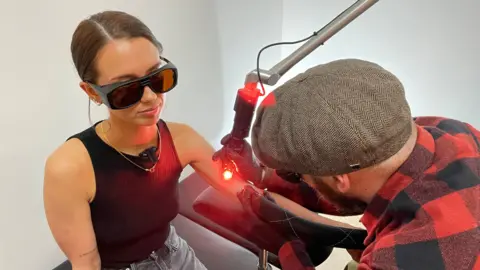 BBC
BBCA tattoo artist who has seen an increase in tattoo removals is warning customers to beware of people using cheap and unsafe equipment to get it done.
Removal specialist Wayne Joyce, who runs Reset Room in Bristol, said he had seen a rise in the number of people being left with permanent scarring and, in some cases, body dysmorphia - a mental health condition where a person spends a lot of time worrying about flaws in their appearance.
Common techniques used for tattoo removal include laser surgery, surgical removal and dermabrasion.
"The biggest concern in the industry right now is the access to equipment that doesn't do what it's supposed to do," Mr Joyce said.
"Yes, they can remove tattoos, but the condition of the skin afterwards can be completely damaged and then leaving the client in a worse-off space than they were before."
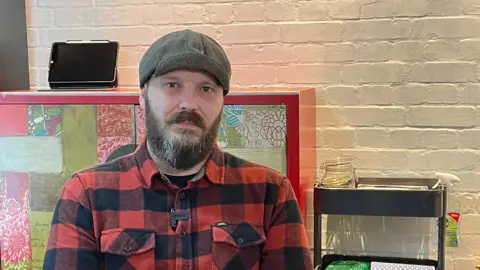
Scarring can happen after most types of tattoo removal but infections or skin discoloration are possible as well.
Mr Joyce said some people are now obtaining dangerous cheap lasers that "don't work properly" and using them in home visits in unsanitary environments.
"There is a difference between people who have been trained and obtained a specific tattoo license from their local authority to carry out tattoo removal work at a proper clinic and unregulated people who buy cheap lasers, put them in the back of their cars and advertise on places like Gumtree," Mr Joyce said.
He explained local authorities had their own rules and regulations on tattoo removal and established clinics had to get a special licence from them to carry out the procedure.
"People also try to use at-home hair removal lasers on themselves for tattoo removal, which is also dangerous," he added.
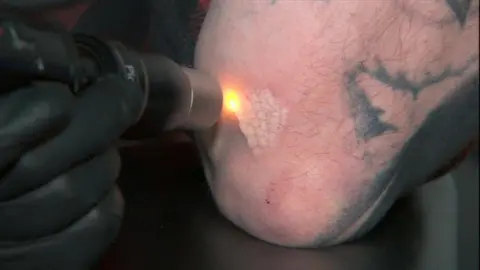
Tattoo removal is normally privately funded and can also be accessed through the NHS as a self-funded treatment or sometimes via a referral.
Mr Joyce said the cost of getting a tattoo removed "is not cheap", often costing more than the actual tattoo.
"You are talking about a few hundred pounds. For larger tattoos, like sleeves, back pieces, then you're looking at a couple of thousand," he said.
Mr Joyce said the technology had rapidly improved over the past 10 years but explained that while tattoos could take a few hours to complete, their removal could take a year "and sometimes even longer".
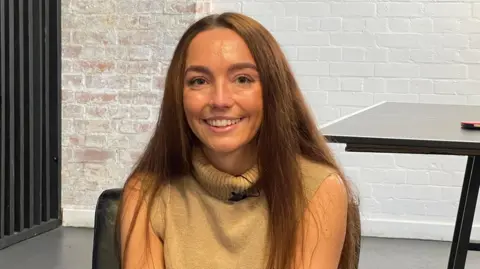
Despite this, Mr Joyce said many people were turning to him for removals.
Jade James, who is getting a tattoo on her arm removed before her wedding in May, said the procedure would help her get her "confidence back" before her big day.
"I started really having low confidence because of my tattoos," she said.
"I thought I was never going to be happy with how I looked anymore.
"I heard about laser tattoo treatment and decided to start trying to gain my confidence back. I just want to get rid of it."
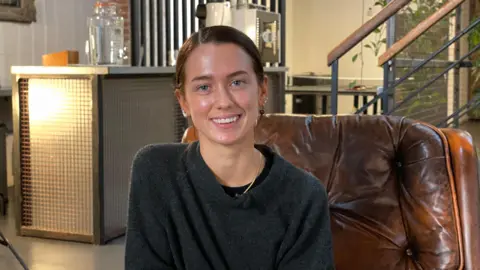
Betsy Davies was offered a free tattoo when the South African rugby team won the world cup last year.
"I do still really like it, but it's too big for my body," she said.
"It was a dreadful thought realising it was going to be on my body for the rest of my life."
After finding Mr Joyce online, she got herself booked in and said getting the tattoo had been more painful than the removal.
"It makes me feel happy knowing it will be gone," she added.
"It's also made me more cautious about getting tattoos in the future."
Follow BBC Bristol on Facebook, X and Instagram. Send your story ideas to us on email or via WhatsApp on 0800 313 4630.
